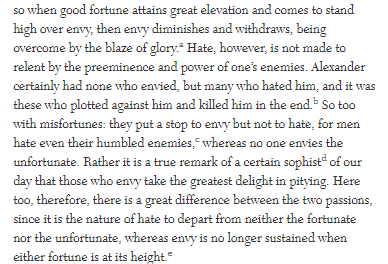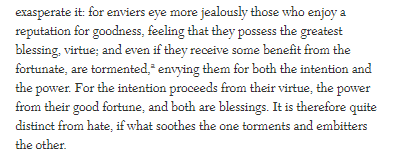On Envy and Hate (Part 1) - The Lindy Newsletter
Highlighted on December 15th, 2020 from https://paulskallas.substack.com/p/on-envy-and-hate-part-1
Does anyone teach human nature anymore? I feel like we as a society have all decided to drop teaching this subject. We now export it to psychologists, writers for the New Yorker, poets and life coaches. I’m not even sure people realize there are objective and real guidelines for certain emotions, and it isn’t just one person’s opinion. There are rules and they have been the same throughout time because the human hasn’t changed.
I posed this simple question to my followers last week.
The answers I received were all over the place. I think certain topics in human nature are important, but only because it teaches us about ourselves, but also as a risk management strategy. I’m not going to do something crazy because I don’t know how to understand what’s going on in my mind. Then I’m going to be wrecked, fall into ruin and it’s game over. And for what? Because I didn’t read the owner’s manual to the car called the human? Well, that’s stupid. The Lindy Effect for human nature is about usefulness. Of harm reduction or avoidance. It isn’t some academic exercise of knowledge or a modern art piece. It’s about having a gun in your hand while walking through a dangerous neighborhood.
As Samuel Johnson said, "We are all envious naturally, but by checking envy, we get the better of it"
So today, let’s discuss an important topic. It’s about envy and hate. We’re going to use a variety of ancient sources to come up with a definition, how it works at the individual level, at the society level, how to extinguish it and why it’s so important. We’re going to examine envy in today’s world as well. Which is a little different than two thousand years ago.
What is Envy?
It’s roughly, a belief that another person has something that I want and "it could have been me". To attract envy all that is required is apparent prosperity. Envy presupposes that I can tell myself a plausible story in which I ended up with the possessions of the envy. This story has to be realistic. Princes may envy kings and starlets envy stars but most people don’t envy kings. The objects of envy are closely connected to me. I envy someone if I believe I could have been like him. The reason I envy rather than try to emulate him is often that I do not believe I CAN become like him- although we were equal at the outset.
For instance, I don’t envy Donald Trump. He’s not in the group I identify with or cluster. So, already in the definition of envy we require a reference group. It’s relational and scale dependent. So who do we compare ourselves too? Usually, people who have the same career as us:
There is an old saying, that the best friends are those who read the same books as you do but have different careers. Why? So you can engage in conversation but not have envy which will destroy the relationship and maybe even the people in it.
During the Trump presidency I noticed many celebrities who had this intense hatred for him. This level of malice was more than what they threw at George W. Bush and he started 2 wars and ended in a huge recession. I think the reason is these celebrities are envious of him. Donald Trump was the first true outsider to win the presidency, the first media monoculture celebrity from the 20th century to attain the highest office. These other celebrities in Hollywood really felt it. They tried to cover it up as part of the "resistance", but it came across as something different than the regular hysterical behavior. To Hollywood, Trump was part of their reference group.
What is Being Envied?
Plutarch cites as grounds for envy: wealth (Nicias), Hubris (Alcibiades), reclusiveness (Nicias), having made the mistake of being right too many times (Aristides), virtue and status.
Admitting to being Envious
One of the things that distinguishes envy from other emotions is that we don’t want to admit it. If we’re angry we say we’re angry, if we’re in love, we say we are in love, if we are sad we say we are sad. But we have a hard time admitting envy. It’s special. It digs deep. As a result we cloak envy and conceal it. We give other reasons for attacking a person.
Among all the emotions of the soul, one stands unmentionable. Envy.
That’s powerful.
Reference Group
On its surface, the reference group seems easy to imagine. People you work with or live around. Ok.
But it isn’t that simple these days. We live in a unique society these days. For instance, this was one the richest men in the world a few hundred years ago:
This is one of the richest men in the world now:
Do you see what’s going on? Zuckerberg shouldn’t be in your reference group, he’s got 100 billion dollars. But he dresses like you, looks like you and he started a website which is trivial that made him a lot of money. Can I do that?
This tweet hit some of my followers hard.
They’re software programmers/engineers/coders. Software developers feel like they should be in the payoff space. In theory they have all the skills needed to make payoffs happen (automating things at scale). Yet most of them remain stuck in the consistency space. Very frustrating place to be. What adds to the frustration is not only being so close, but also seeing those who made large amounts of money act like they are in your reference group. The flipside of "this could be you" is "this is not you" but you’re going to be comparing yourself to them.
Isocrates:
The monarch might, in fact take active steps to make himself appear beyond envy.
According to Herodotus:
Instagram and Envy
A lot of people are working BS jobs or jobs they’ve checked out from. They don’t identify themselves with their careers. So their reference group isn’t work. it’s something else. What is it? People they follow on Instagram and Facebook. The problem is people on those sites are posting vacation photos and achievements. You’re just getting someone’s best times beamed at you through the screen, but without any of their bad times. You start to think your life sucks, or you want what they have. Then everyone else engages in it and it becomes weird. Then you add in the people marketing a brand or a product and it ends up being a big source of unhappiness.
Every once in a while Instagram or Facebook try to address envy concerns by proposing hiding the follower number. You’re artificially increasing your reference group and then only being selectively shown someone’s life they want to show you. A lot of envy in those places.
Then this brings up the question if we can truly "choose" our reference group. Or is it chosen for us by our circumstances. I don’t know how to answer that question.
Envy Enjoyment
Clearly, envying someone is a horrible feeling. You feel terrible doing it. But what about being envied?
Spanish poet, Francisco de Quevedo said, "that whoever does not want to be envied does not want to be a man."
So being envied is a signal, at least, that you’re doing something relatively remarkable.
But the actual feeling of being envied by others is enjoyable on its own. But the enjoyment feels a little like ashes in the mouth. It is not a "clean" enjoyment so to speak. But crucially, it also means you are not successful enough, People think you are in their reference group!
Things also can get really weird and dirty when there is someone who enjoys being envied by another who is envious. This crazy relationship. The envied will try to keep the envious dangling, finding fun in the misery of the other. You see this a lot in the workplace. These little games people play within teams or departments. Or, you see it at social events.
It’s also dangerous. Look at what happened to John Lennon and Versace. Killed by some crazy envious men.
Envy Provoked by a Third Party
What’s the definition of being rich?
It’s having one more dollar than your wife’s sister’s husband. Sometimes you’ll be thrown into some game of envy you didn’t sign up for. But you are obliged to play because you’re a social creature who exists in this world. You’re being defined by this group.
Sometimes this can be very annoying. Picture 2 couples. The husband is working on a project with upside but it isn’t here yet (it may never come). The other man in the other couple has a steady job making good money. The first fellow will seem like he is behind in the game. Although, they are in two different domains and shouldn’t be compared.
Preemption
How do people end up dealing with envy? A few ways.
1) Immediate suppression of the envious urge and go along with your life. This is what most people do day to day.
2) Devalue the person. A common mechanism is to devalue other aspects of the person whom one would otherwise envy. The stereotype that beautiful blondes are dumb is probably due to other women’s envy rather than to male chauvinism. La Bruyere noted that adding additional criteria of evaluation was prominent in French villages, "It is possible for a villager to reject or annul almost any bid for prestige or accusation of low status because of the diversity of ranking criteria."
Once a person has identified some aspect in which he is superior to the envied person he will tend to value that aspect more highly, a bit like the person who after hesitating between two cars ends up buying one because it is faster and then upgrades the importance of speed relative to the other criteria.
3) Devaluing the the envied object. The famous story from Aesop Fable’s about the fox and the sour grapes is about this. Or today we hear sometimes there is a rich person in the neighborhood we say, "Look at how many hours he works, I don’t want that life". The superior possessions of the other are not denied, but the envious person alleviates the tension in a different way, by saying its not worth getting due to the cost.
Nietzsche argued Christianity resolves the tension of envy by declaring that possessions are never desirable and are in fact an obstacle to salvation. This changes values. And rather than having to debunk each instance of superiority by some explanation, the inferior can now tell himself that he is superior by virtue of the properties that formerly constituted his inferiority.
Extinguishing Envy
Let’s say you have some success in life. You have wealth, status, virtue, etc. You see people are envious and you want to put a stop it it because envy can be dangerous. The immediate action tendency of envy is to destroy the envied object or its possessor. That means you.
If you listen to hip-hop, the theme of envy keeps coming up in lyrics. As the rappers are from the lower class on their way up to the upper class and facing envy ("haters") all the way up. I thought this was all fake when I was growing up. But I started posting on twitter and gaining followers, I started seeing people hate me for no reason. Real dark stuff. Then once I was out of those smaller account categories (reference groups) I was attacked by larger accounts as I gained followers. You see this same pattern in business and other status endeavors.
Ideally, I would like to enjoy my material possessions and to bask in your envy of them, but if you destroy them I cannot also enjoy them. This is the standard paradox for the Greeks – one wants to be honored and this is impossible for a poor man, and yet honor and wealth inspire envy in others and this envy must not be fostered. Because some envious men will try to destroy me or my things. This is a universal feeling.
One thing we know is clear about envy is that it extinguishes by fortune (luck, chance). If you ascend high enough over your reference group they won’t see you as a peer and you will not be envied anymore. Plutarch uses the example of Alexander the Great. The other way to extinguish to envy is another mechanism fortune: Losing it all! No one envies a man who falls down the ladder. They pity him.
But let’s say you want to take things into your own hands and not wait for fortune to either help you ascend to the heavens or down the ladder to hell. What can you do?
Strategies
To avoid being the target of destructive envy; one can either divest oneself of one’s assets or hide them. However, divestiture may be self-defeating:
1) You can give the envious a gift, bribe them, buy them off, shower them in presents so they stop envying. This doesn’t work and in fact causes even more envy
2) Outright destruction of assets might not achieve the goal either, because it suggests an enviable lack of concern for the envied goods.
3)….
End of Part 1
——
Part 2: Strategies, and how Envy affects society at scale to be Published on Thursday












